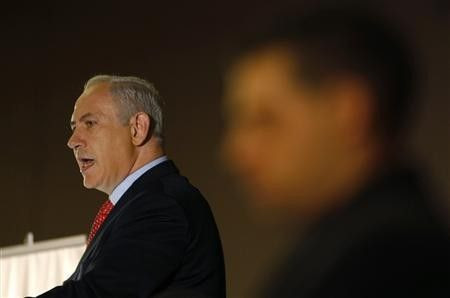Suez cancellation lifts Egypt diplomatic strain

The cancellation of plans by two Iranian naval vessels to pass through the strategic Suez Canal removed on Thursday a potential foreign policy headache for the new military rulers struggling to get Egypt back on its feet.
The Higher Military Council that took over after the overthrow of Hosni Mubarak, was under pressure on Thursday from pro-democracy activists who want the immediate release of political prisoners and the lifting of emergency rule.
Its top priorities after suspending the constitution are restoring law and order and reviving the economy, which was damaged by the 18-day revolution, but the issue of the Iranian warships had threatened to become a distraction.
Israel's foreign minister had called the proposed passage a provocation, and its go-ahead could have put Egypt, a key ally of the United States which has a peace treaty with Israel, in an awkward diplomatic position.
The Suez Canal Authority was informed today about the cancellation of two scheduled trips of two Iranian warships and no new date was set to cross the Suez, an official, who declined to be named, told Reuters.
Life in Egypt is still far from normal six days after the momentous overthrow of Mubarak, 82, with tanks on the streets of Cairo, banks closed, worker protests and demonstrations given voice by revolutionary fervour and schools shut down.
An ailing Mubarak, holed up with his family in the Red Sea resort of Sharm el-Sheikh, is still coming to terms with the tumultuous events that unseated him and is apparently shunning exile and vowing to live and die on Egyptian soil.
Pro-democracy leaders plan to bring one million people out on the streets for a Victory March on Friday to celebrate the revolt, and perhaps remind generals of the power of the street. The military on Thursday was setting a strategy for policing it.
The momentous revolt that ended 30 years of iron rule by Mubarak has sent shock waves around the Middle East. Bahraini police stormed a protest camp in the capital Manama early on Thursday, killing at least three people, and there has been trouble on the streets of Iran, Libya, Iraq and Yemen.
PROVOCATION OR MISCHIEF
It was not immediately clear which side was behind the cancellation of the Iranian Suez canal passage. Any naval vessels passing through the canal, an international shipping route, must first have approval from Egypt's foreign and defence ministries, officials said.
If the ships had crossed, they would have been the first Iranian warships to have passed through the canal since Iran's 1979 revolution.
The revolution poisoned ties with Egypt, which signed the peace treaty with Israel that year.
Israeli Foreign Minister Avigdor Lieberman had said plans for the two Iranian warships to sail through the canal en route to Syria were a provocation, but a retired British admiral described the proposed voyages as a form of mischief.
Egypt is in a sense the guarantor of free passage of goods and people through the Canal, said Middle East expert Neil Partrick. So you could say this might be a provocative move at a time when Egypt is moving into a period of uncertainty.
The upheaval in Egypt has caused concern in Israel and Washington, suspicious of the rise of the Islamist Muslim Brotherhood, a mass organisation that is sure to play a key role in the future of modern Egypt.
A committee, which includes a member of the Brotherhood, Sobhi Saleh, as well as legal and constitutional experts, was meeting on Thursday as the military dismantles the mechanism that kept Mubarak's autocratic rule in place.
Saleh said on Wednesday the military council had pledged to lift emergency laws before parliamentary and presidential elections are held. It was not immediately possible to confirm whether the council had given such a guarantee.
Some secular leaders fear that racing towards elections in a nation where Mubarak suppressed most opposition activity may hand an edge to the Brotherhood, banned under Mubarak.
AMENDING THE CONSTITUTION
The military council has already dissolved parliament and suspended the constitution and now the committee must hammer out new amendments, likely to shorten presidential terms and ensure fair election rules, that must be ready in 10 days.
As part of a transition to democracy and civilian rule, the nation will vote in a referendum on the amendments prior to parliamentary and presidential elections within six months.
Any transition will be fraught with difficulty as old ways of doing things may die hard in a country where the ruling party routinely rigged elections and candidates used bribery, hired thugs and dirty tricks to ensure victory.
Uncertainty remains over how much influence the military will seek to exert in reshaping a corrupt and oppressive ruling system which it has propped up for six decades.
Members of the new pro-democracy Council of Trustees of the Revolution appeared at a news conference in downtown Cairo on Wednesday night to say its goal was to unite ranks, protect the revolution and open a dialogue with the military.
Existing registered parties are mostly small, weak and fragmented. The Muslim Brotherhood, which under the now suspended constitution could not form a party, may be the best organised group, but its true popularity has yet to be tested.
With no clear leadership, the youth movement that was pivotal to the revolution due to its use of social networking sites to organise protests is seeking to overcome divisions and expects to announce a new political party on Thursday.
The U.S. Treasury on Wednesday told American banks to closely monitor transactions related to ousted Egyptian officials for any signs state assets were being misappropriated.
© Copyright Thomson Reuters 2024. All rights reserved.




















